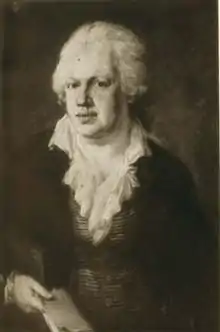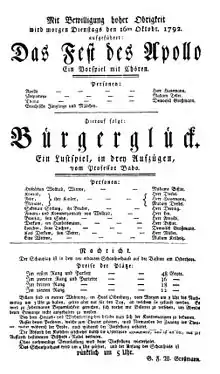Joseph Marius Babo
Joseph Marius Babo (January 14, 1756 in Ehrenbreitstein – February 5, 1822 in Munich). As a dramatist, Babo preferred action based on history. In Otto von Wittelsbach, written in 1781, he followed the path blazed by Goethe in Götz von Berlichingen. Sometimes one could see he was acquainted with Shakespeare. He filled a variety of pedagogical and bureaucratic roles related to the theater over his life.
Joseph Marius Babo | |
|---|---|
 Oil portrait by Johann Georg Edlinger | |
| Born | 14 January 1756 Ehrenbreitstein |
| Died | 5 February 1822 (aged 66) Munich |
Works

Playbill for the debut of Bürgerglück on the occasion of the dedication of the Bremer Stadttheater (1792)
- Arno (1776)
- Das Lustlager (1778, probable author)
- Das Winterquartier in Amerika (1778)
- Dagobert der Franken König (1779; English edition: Dagobert, King of the Franks, 1800)
- Reinhold und Armida (1780)
- Die Römer in Teutschland (1780)
- Otto von Wittelsbach (1782), a play based on the life of Otto II Wittelsbach, Duke of Bavaria (1206–1253), and Count Palatine of the Rhine
- Die Maler (1783)
- Die Fräulein Wohlerzogen (1783)
- Ueber Freymaurer. Erste Warnung (1784)
- Nöthige Beylage zur Schrift: Über die Freymaurer „erste Warnung“ (1784)
- Gemälde aus dem Leben der Menschen (1784)
- Vollständiges Tagebuch der merkwürdigsten Begebenheiten und Revolutionen in Paris (1789, translated from French)
- Die Strelitzen (1790)
- Bürgerglück (1792)
- Anleitung zur Himmelskunde in leichtfaßlichen astronomischen Unterhaltungen (1793)
- Schauspiele (1793)
- Neue Schauspiele (1804)
- Der Puls (1805)
- Albrechts Rache für Agnes (1808)
Bibliography
- Pfeuffer, Ludwig: Joseph Marius Babo als Leiter des Münchener Nationaltheaters 1799–1810. München, Univ., Diss., 1913
- Wurst, Jürgen: Joseph Marius Babo. In: Wurst, Jürgen und Langheiter, Alexander (Hrsg.): Monachia. München: Städtische Galerie im Lenbachhaus, 2005. S. 163. ISBN 3-88645-156-9
References
- Joseph Kürschner (1875), "Babo, Joseph Marius Freiherr von", Allgemeine Deutsche Biographie (ADB) (in German), 1, Leipzig: Duncker & Humblot, pp. 726–727
- Portions of this article are based on translations from the German Wikipedia.
- Carl Schurz, Lebenserinnerungen bis zum Jahre 1852, Berlin: Georg Reimer, 1906 and 1911. (in German) As a student in a gymnasium in Cologne (Chapter 3), Schurz was in the care of a locksmith who took him to plays occasionally. Schurz writes: “The taste of my friend the locksmith ran to knight dramas ... The first piece I saw at the side of my locksmith was Otto von Wittelsbach, at that time a famous knight play in which the hero meets King Philipp of Swabia, who cheats him in a chess game. With an armored fist, the hero strikes the chess board so the pieces fly over the stage, and then strikes the king down with a blow from his sword.”
External links
- Joseph Marius Babo in the German National Library catalogue
- Bürgerglück in Google Books. (in German)
- Anleitung zur Himmelskunde in leichtfaßlichen astronomischen Unterhaltungen in Google Books. (in German)
This article is issued from Wikipedia. The text is licensed under Creative Commons - Attribution - Sharealike. Additional terms may apply for the media files.